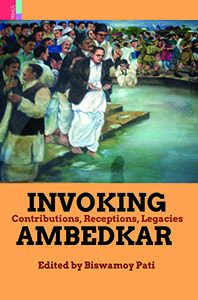
Invoking Ambedkar: Contributions, Receptions, Legacies
EDITOR- Biswamoy Pati
| HB ₹795 . $59.95 . ₤39.95 |
||
INFORMATION
- EDITOR : Biswamoy Pati
- HB ISBN : 978-93-80607-90-0
- Year : 2014
- Extent : xii + 172 pp.
- Discount available on checkout
- Usually dispatched within 3 to 5 working days.
Invoking Ambedkar
| HB ₹ 795 . $ . ₤ |
||
INFORMATION
- AUTHOR –
- ISBN – 978-93-80607-90-0
- Year – 2014
- Extent: 400 + 40 coloured illustrations
- 10% discount + free shipping
- Usually dispatched within 3 to 5 working days.
B.R. Ambedkar was intimately involved with many factors that created the basis of what India is today. At the same time, one cannot overlook Ambedkar’s ‘past’ and the fact that he grew up facing discrimination and being made to sit on the floor outside the classroom as a child, as he was a Dalit. Even today, millions of Dalit children face similar discrimination in their everyday life. Such incidents are distinct reminders of the continuing relevance of Ambedkar and the uncivil and barbaric nature of India’s ‘civil’ society.
This book brings together a wide variety of scholarly ideas: the way ‘Aryans’ are perceived in Dalit historical thinking; seeing the problem of Dalit liberation through the lenses of Adam Smith; the election of the Constituent Assembly (1946) with which Ambedkar was intimately involved, and which scripted India’s Constitution; the approach of Gandhi and Ambedkar to the process of planning and India’s economic development; and Ambedkar’s attitude to Marx and Buddha, as well as Dalit Christianity. This book also includes a comparative study of Ambedkar and some of his contemporaries like Charan Singh and Ram Manohar Lohia in Uttar Pradesh.
The Editor
Biswamoy Pati is Associate Professor in Modern Indian History, University of Delhi. His latest publications include South Asia from the Margins: Echoes of Orissa, 1800-2000 (2012).
B.R. Ambedkar was intimately involved with many factors that created the basis of what India is today. At the same time, one cannot overlook Ambedkar’s ‘past’ and the fact that he grew up facing discrimination and being made to sit on the floor outside the classroom as a child, as he was a Dalit. Even today, millions of Dalit children face similar discrimination in their everyday life. Such incidents are distinct reminders of the continuing relevance of Ambedkar and the uncivil and barbaric nature of India’s ‘civil’ society.
This book brings together a wide variety of scholarly ideas: the way ‘Aryans’ are perceived in Dalit historical thinking; seeing the problem of Dalit liberation through the lenses of Adam Smith; the election of the Constituent Assembly (1946) with which Ambedkar was intimately involved, and which scripted India’s Constitution; the approach of Gandhi and Ambedkar to the process of planning and India’s economic development; and Ambedkar’s attitude to Marx and Buddha, as well as Dalit Christianity. This book also includes a comparative study of Ambedkar and some of his contemporaries like Charan Singh and Ram Manohar Lohia in Uttar Pradesh.
The Editor
Biswamoy Pati is Associate Professor in Modern Indian History, University of Delhi. His latest publications include South Asia from the Margins: Echoes of Orissa, 1800-2000 (2012).
Table Of Contents
| Notes on Editor and contributors | ix-x |
| Foreword | xi-xii |
| 1. In Lieu of an Introduction Biswamoy Pati |
1-3 |
| 2. The ‘Aryans’ in Dalit Historical Thinking Shashi Bhushan Upadhyay |
5-20 |
| 3. The Problem of Dalit Liberation Seen through the Lenses of Adam Smith Amiya Kumar Bagchi |
21-31 |
| 4. Orchestrating a Signal Victory: Ambedkar, Mandal and the 1946 Constituent Assembly Election Anirban |
33-57 |
| 5. Planning and Economic Development: Ambedkar versus Gandhi Rowena Robinson |
59-71 |
| 6. Ambedkar and his Understanding of Karl Marx and Buddha Raj Sekhar Basu |
73-92 |
| 7. Legacies of Dr. B.R. Ambedkar and his Contemporaries in Uttar Pradesh: A Comparison of Ambedkar, Charan Singh and Lohia Jagpal Singh |
93-106 |
| 8. Ambedkar and Dalit Christianity: Emergent Trends Bonita Aleaz |
107-125 |
| 9. Dr Ambedkar, Neo-liberal Market-Economy and Social Democracy in India Ronki Ram |
127-152 |
| 10. What Made Ambedkar Great Swaraj Basu |
153-166 |
| Index | 167-172 |




